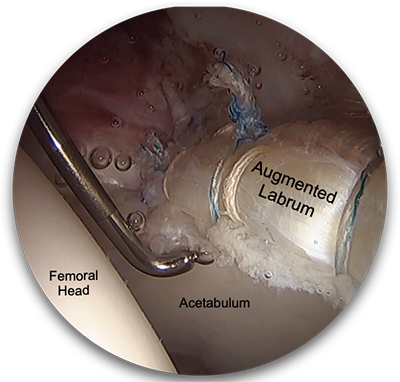Hip Labral Augmentation
What is Hip Labral Augmentation?
Hip labral augmentation is a surgical procedure aimed to enhance the function of the labrum, which is a ring of cartilage that lines the hip socket providing stability to the hip joint. In contrast to labral reconstruction, where the labrum is replaced with a graft, labral augmentation is used when the existing labrum is partially intact but requires further reinforcement. The goal of labral augmentation is to strengthen sections of the labrum that are damaged or thinned out. This preserves other areas of the labrum that are still healthy and functional.

Why is Labral Augmentation Needed?
In cases where the labrum is partially damaged but still viable, augmentation provides an alternative to complete reconstruction. By reinforcing the labrum, surgeons can restore its natural role in maintaining the suction seal of the hip joint, reducing pain, and preventing further joint degeneration. This technique is particularly beneficial for patients who experience persistent pain and instability despite previous repair surgeries or those with insufficient tissue for a full repair.
How will I know if I need a Hip Labral Augmentation?
A comprehensive evaluation, including physical examination, medical history, and imaging studies (usually MRI), helps confirm the diagnosis of a labral tear and will help guide the decision if reconstruction is necessary. Diagnostic injections may also be used to localize pain and guide treatment decisions. However, the final decision to perform a labral augmentation is made during the procedure once we see the extent of labral damage.
What are the Treatment Options for Labral Tears?
Treatment options for labral tears include both non-operative and surgical interventions.
Non-Operative Management:
For less severe cases, non-operative management may be effective. This can include:
- Physical Therapy: Focuses on strengthening the muscles around the hip to improve stability, enhance range of motion, and reduce pain.
- Activity Modification: Patients may be advised to avoid activities that worsen their symptoms, such as running or jumping, and switch to low-impact exercises like swimming.
- Pain Management: Anti-inflammatory medications or injections may be used to control pain while the hip is rehabilitated.
Surgical Management:
For patients with extensive labral damage or those who do not respond to conservative treatments, surgical intervention may be necessary.
Hip Arthroscopy and Labral Augmentation:
Hip arthroscopy is a minimally invasive procedure to access the hip joint using small incisions and specialized instruments. During the labral augmentation, the damaged or thinned-out portions of the labrum are reinforced with a tissue graft, which can come from the patient or a donor. This process allows us to preserve as much of the native labrum as possible while enhancing its structure.
Key aspects of the procedure include:
- Labral Augmentation: The graft is attached to the weakened area of the labrum to reinforce it, improving its ability to stabilize the hip joint. The healthy portion of the labrum remains intact, maintaining natural joint anatomy.
- FAI Correction: If necessary, bony impingements are removed by reshaping the femoral head or the acetabulum to prevent further damage.
- Capsular Plication: Tightening of the joint capsule to reduce excessive movement and improve stability.
Rehabilitation after Labral Augmentation
Postoperative rehabilitation is essential for a successful recovery after labral augmentation. Physical therapy typically begins soon after surgery, focusing on restoring range of motion, improving strength, and gradually increasing weight-bearing activities. Full recovery can take several months, with most patients returning to their normal activities around 4-6 months, possibly 1 year for maximal recovery.
If you are suffering from a damaged or thinned hip labrum and may benefit from labral augmentation, schedule a consultation with board-certified hip surgeon Dr. Shane Nho. Dr. Nho is known as one of the leading hip preservation specialists in the Chicago region. He offers advanced surgical techniques at his offices in Chicago, Oak Brook, IL, and Munster, IN.
At a Glance
Dr. Shane Nho
- Board-certified, fellowship-trained orthopedic surgeon
- Team Physician for Chicago Bulls, White Sox, Steel
- Performs more than 700 procedures each year
- Learn more
